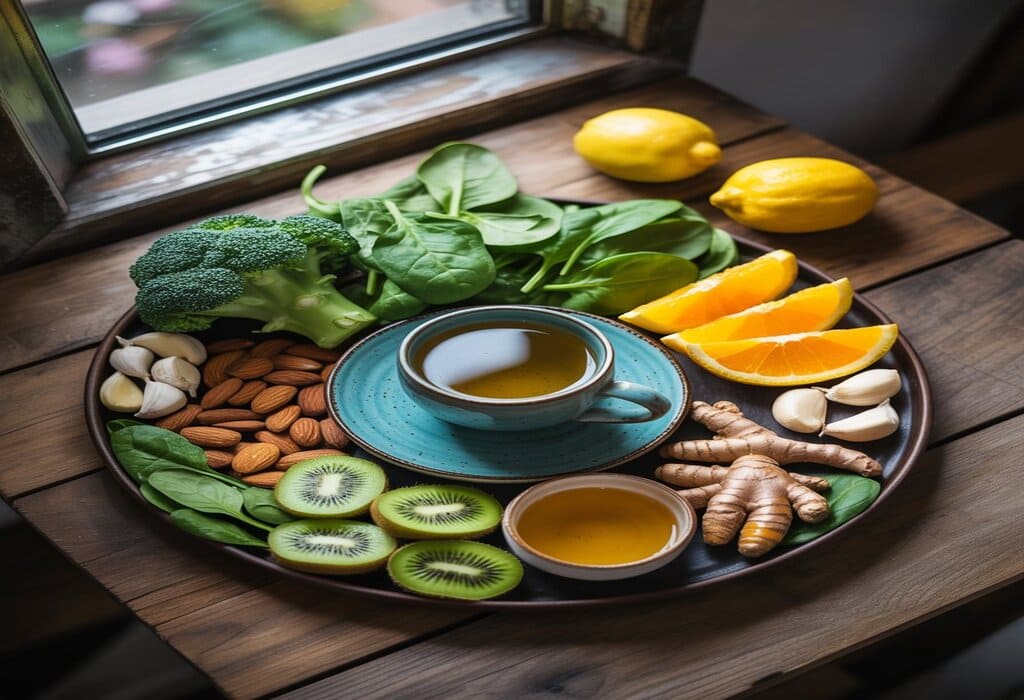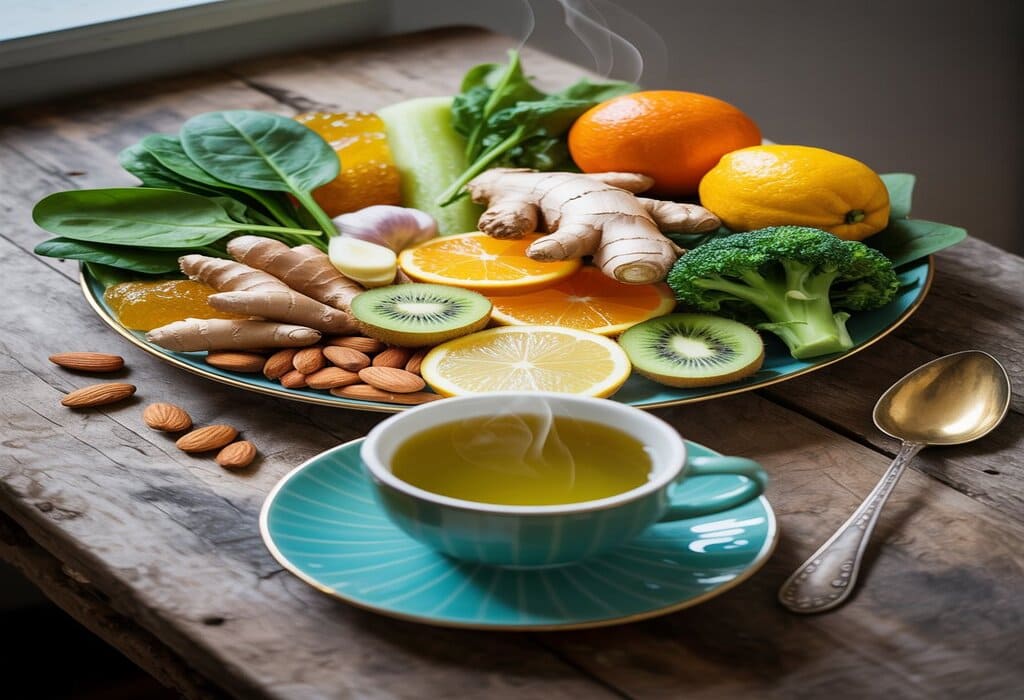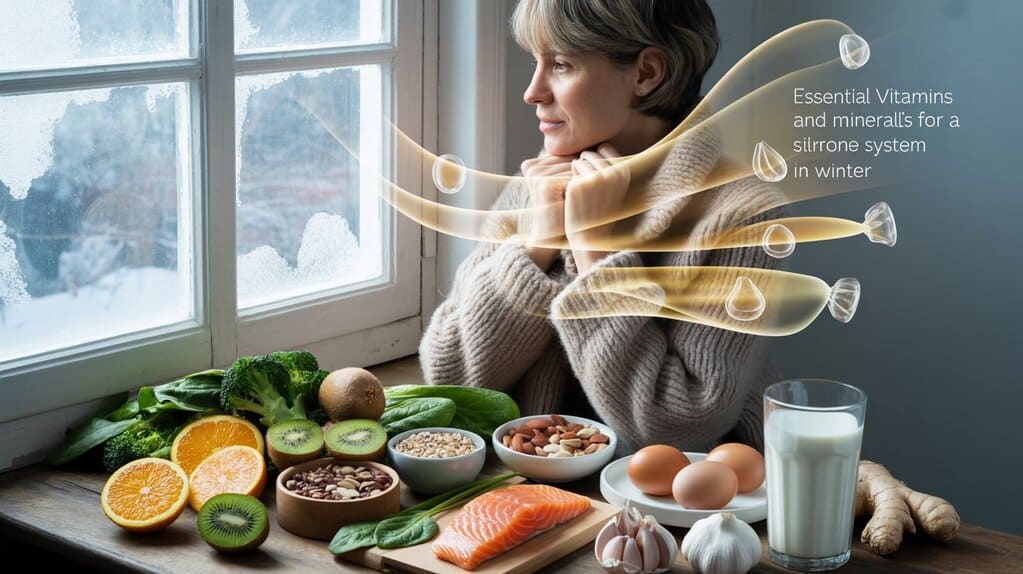
Introduction
A resilient immune system is one of the best defenses against infections and chronic disease. While genetics and age matter, nutrition is a practical, powerful lever you can control every day. Eating immune-boosting foods and getting the right vitamins and minerals supports immune cell function, lowers harmful inflammation, and helps your body respond to pathogens more effectively. This article explains which foods and nutrients matter most, how they work, and what recent scientific studies from Asia, Europe, and North America show about diet and immune health. The guidance below is SEO-friendly and written to be clear, translatable, and evidence-based.
Key points
- Nutrition strongly influences immune function; whole foods supply the cofactors immune cells need. (PMC)
- Vitamin D, vitamin C, zinc, omega-3s, and probiotics are repeatedly linked to better immune outcomes in clinical studies. (PubMed, PMC)
- Plant foods, fermented foods, fatty fish, nuts and seeds, and colorful fruits and vegetables are practical daily choices to support immunity. (Gut, PMC)
- Integrating herbs and spices (e.g., turmeric/curcumin, garlic, ginger) can provide complementary anti-inflammatory and immune-modulating effects. (Frontiers, PMC)

How food affects immunity — the science in brief
Immune cells require energy and specific micronutrients to develop, signal, and kill microbes. Vitamin C is a potent antioxidant and cofactor that supports several innate and adaptive immune functions, including epithelial barrier integrity and white blood cell activity. (PMC)
Vitamin D plays a modulatory role in both innate and adaptive immunity; randomized trials and meta-analyses have shown that vitamin D supplementation reduces the risk of acute respiratory infections in certain populations. (PubMed)
The gut microbiome educates and regulates immune responses — probiotics and dietary fiber influence gut bacteria that, in turn, shape immune cell development and inflammation. (Gut, PMC)
Omega-3 fatty acids (EPA/DHA) help resolve inflammation and support balanced immune signaling, important for preventing chronic immune activation that weakens host defenses. (PMC)
Finally, bioactive plant compounds (polyphenols, flavonoids, curcuminoids) act as antioxidants and immune modulators, demonstrated in multiple preclinical and clinical studies. (Frontiers)

Table — Core immune nutrients, top food sources, and immune roles
| Nutrient | Top food sources | Primary immune roles |
|---|---|---|
| Vitamin C | Oranges, kiwi, strawberries, bell peppers | Antioxidant; supports white blood cell function. (PMC) |
| Vitamin D | Fatty fish, fortified milk, sunlight | Modulates innate & adaptive responses; linked to fewer respiratory infections. (PubMed) |
| Zinc | Oysters, red meat, legumes, pumpkin seeds | Essential for immune cell development and signaling. |
| Iron | Red meat, lentils, spinach | Supports oxygen delivery and immune cell energy metabolism. |
| Omega-3 (EPA/DHA) | Salmon, mackerel, sardines, chia seeds | Anti-inflammatory; balances immune signaling. (PMC) |
| Probiotics / Fiber | Yogurt, kefir, kimchi, whole grains, legumes | Shapes gut microbiota and mucosal immunity. (PMC, Gut) |
| Polyphenols / Curcumin | Green tea, berries, turmeric | Antioxidant and immunomodulatory activities. (Frontiers) |
Top immune-boosting foods and practical tips
1. Colorful fruits and vegetables (daily)
Load your plate with citrus, berries, bell peppers, broccoli, spinach, and other colorful produce. These foods deliver vitamin C, polyphenols, and fiber that support immune cells and the gut microbiome. Routine consumption has been associated with improved markers of immune health. (PMC, Gut)
2. Fatty fish (2× per week)
Salmon, mackerel, herring, sardines provide EPA/DHA and vitamin D — both linked to balanced inflammatory responses important for infection control and recovery. If you don’t eat fish, consider an omega-3 supplement after consulting a clinician. (PMC)
3. Fermented and fiber-rich foods
Probiotic foods such as yogurt, kefir, sauerkraut, kimchi, and high-fiber whole foods (beans, oats, vegetables) feed beneficial gut bacteria. A healthier gut microbiome correlates with improved systemic immunity and vaccine responses. (PMC, Gut)
4. Nuts, seeds, and lean animal proteins
Pumpkin seeds (zinc), almonds (vitamin E), poultry and eggs (protein and micronutrients) are foundational to immune cell repair and function.
5. Herbs and spices with scientific backing
Turmeric/curcumin, garlic, ginger, and green tea contain compounds that reduce harmful inflammation and support immune signaling pathways in laboratory and clinical studies. Use them regularly in cooking or as standardized extracts where appropriate. (Frontiers, PMC)

How much and how often? — Practical serving guidance
- Vegetables & fruits: 5+ servings/day (mix colors).
- Fatty fish: 2 servings/week (or daily plant-based omega-3s).
- Fermented foods: 1 serving/day (e.g., ½ cup yogurt or kefir).
- Nuts/seeds: 1 small handful/day.
- Use herbs/spices daily in cooking; consider supplements only after medical advice.
Evidence from prominent scientists and recent studies
- Vitamin C — Reviews led by researchers such as Dr. Anthony Carr conclude vitamin C supports multiple immune functions and can shorten cold duration in some trials. (PMC, BioMed Central)
- Vitamin D — Meta-analyses by Dr. Adrian Martineau and colleagues (UK) demonstrate a modest protective effect of daily/regular vitamin D supplementation against acute respiratory infections, especially in people with low baseline levels. (PubMed)
- Gut microbiome & probiotics — European and global researchers (e.g., de Vos et al.) show strong mechanistic links between diet, microbiota composition, and immune homeostasis. Clinical studies indicate certain probiotics can modulate immune markers and reduce infection risk. (Gut, PMC)
- Omega-3 fatty acids — North American and international teams report that EPA/DHA regulate inflammatory mediators and may improve immune cell balance (Th1/Th2), with potential benefits for infection recovery and vaccine response. (PMC)
- Curcumin & plant polyphenols — Reviews from Asia and Europe document curcumin’s immunomodulatory activity across immune cell types, while noting variability in human trial results and bioavailability concerns. (Frontiers)

Safety, interactions, and when to see a clinician
- Whole foods first. Supplements can help in deficiency but are not substitutes for a varied diet. (Bureau des Suppléments Alimentaires)
- Check for interactions. High doses of micronutrients (e.g., zinc, vitamin D) and herbal extracts can interact with medications. Consult your healthcare provider before starting supplements.
- Quality matters. Choose reputable brands and standardized extracts when using herbal supplements.
- If you have autoimmune disease, are pregnant, or are immunocompromised, always seek specialist advice before making major dietary or supplement changes.
Conclusion
Eating a nutrient-rich, varied diet is one of the most effective, evidence-based ways to support your immune system. Focus on colorful fruits and vegetables, fatty fish, fermented foods, nuts and seeds, and immune-active herbs and spices. Combine these dietary choices with adequate sleep, regular physical activity, stress management, and vaccination when appropriate — together they form a robust, practical strategy to strengthen your immunity naturally.
Selected references and further reading
- Carr AC, Maggini S. Vitamin C and Immune Function. Nutrients. 2017. (PMC)
- Martineau AR, et al. Vitamin D supplementation to prevent acute respiratory tract infections: systematic review and meta-analysis. BMJ/PLoS/Clin Trials (2017, updated 2021). (PubMed)
- Mazziotta C, et al. Probiotics Mechanism of Action on Immune Cells and Immune Homeostasis. Frontiers/PMC. 2023. (PMC)
- Bland JS, et al. Therapeutic Use of Omega-3 Fatty Acids for Immune Function. PMC. 2022. (PMC)
- Zeng L, et al. Curcumin and Curcuma longa Extract in the Treatment of Immune Conditions. Frontiers in Immunology. 2022. (Frontiers)
- de Vos WM, et al. Gut microbiome and health: mechanistic insights. Gut. 2022. (Gut)
- National Institutes of Health — Office of Dietary Supplements. Dietary Supplements for Immune Function (factsheet). 2025 update. (Bureau des Suppléments Alimentaires)
- Wikipedia — Immune system (overview). (Wikipédia)







